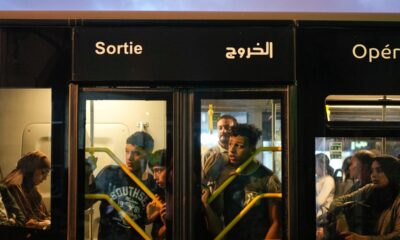Politics
Gen Z’s ‘Stare’ Sparks Debate on Emotional Expression in Society

The phenomenon known as the “Gen Z stare” has emerged as a topic of conversation, highlighting a shift in emotional expression among younger generations. This behavior, characterized by a lack of visible reaction during interactions, has drawn attention and criticism, particularly from older generations.
This trend seems to stem from the unique upbringing of Generation Z, who have grown up in a digital landscape where their expressions have been closely monitored and curated. Many in this generation started using platforms like Snapchat at a young age, allowing them to live their lives through a camera lens. This constant self-observation has led to a heightened awareness of facial expressions and how they are perceived by others.
In conversations, individuals often find themselves pausing, as they process what has been said, leading to a seemingly neutral expression. This pause is not indicative of disinterest but rather a reflection of their conscious effort to manage their reactions. Unlike previous generations, who did not have the same level of scrutiny, Gen Z has developed a different relationship with their emotions and expressions.
The impact of television and social media cannot be overlooked. Reality television, such as shows featuring the Kardashians or Molly Mae Hague, offers insight into this evolution. Early seasons showcased raw expressions and unfiltered reactions, while contemporary episodes reveal a more polished and controlled demeanor. This shift may be attributed to the self-awareness that comes from constant self-exposure.
The COVID-19 pandemic further accelerated this trend. Many young professionals began their careers in a virtual environment, where they could see themselves during meetings. This experience has contributed to a greater understanding of their “listening face” and how their expressions are interpreted by others.
Interestingly, this hyper-awareness of expressions is not confined to Generation Z. Many people today exhibit similar behaviors, characterized by delayed responses and neutral expressions. This has been compounded by the widespread acceptance of aesthetic treatments; in the UK, an estimated 11 percent of the population has undergone some form of cosmetic enhancement. As a result, some individuals may struggle to display emotions due to physical limitations.
Despite the criticism, there is a certain empowerment in maintaining a neutral expression. The ability to remain unbothered in the face of unexpected news can be amusing, as it leaves others guessing about one’s true feelings. The so-called “Gen Z stare” encapsulates this nonchalance, serving as a tool for both self-expression and playful defiance.
As society continues to navigate the complexities of emotional communication, the Gen Z stare may evolve further. What remains clear is that this generational behavior reflects broader changes in how individuals engage with their own feelings and the expectations of others.
-

 World2 weeks ago
World2 weeks agoCoronation Street’s Shocking Murder Twist Reveals Family Secrets
-

 Entertainment1 week ago
Entertainment1 week agoAndrew Pierce Confirms Departure from ITV’s Good Morning Britain
-

 Entertainment5 months ago
Entertainment5 months agoKate Garraway Sells £2 Million Home Amid Financial Struggles
-

 Entertainment4 months ago
Entertainment4 months agoAnn Ming Reflects on ITV’s ‘I Fought the Law’ Drama
-

 Entertainment1 month ago
Entertainment1 month agoCoronation Street Fans React as Todd Faces Heartbreaking Choice
-

 Health4 months ago
Health4 months agoKatie Price Faces New Health Concerns After Cancer Symptoms Resurface
-

 World1 month ago
World1 month agoBailey Announces Heartbreaking Split from Rebecca After Reunion
-

 Entertainment2 weeks ago
Entertainment2 weeks agoTwo Stars Evicted from I’m A Celebrity Just Days Before Finale
-

 Entertainment4 months ago
Entertainment4 months agoCoronation Street’s Carl Webster Faces Trouble with New Affairs
-

 World2 weeks ago
World2 weeks agoKevin Sinfield Exceeds Fundraising Goal Ahead of Final Marathons
-

 Entertainment4 months ago
Entertainment4 months agoWhere is Tinder Swindler Simon Leviev? Latest Updates Revealed
-

 Entertainment5 months ago
Entertainment5 months agoMarkiplier Addresses AI Controversy During Livestream Response





















